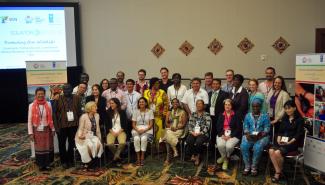
At this year’s World Conservation Congress in Honolulu, Hawai’i, held by the International Union for Conservation Nature (IUCN), the world’s oldest and largest global environmental organization, over 200 Indigenous representatives joined some 10,000 leaders and decision-makers from government, civil society, business, and academia to collectively work toward conserving the environment and harnessing solutions to global challenges.
In a landmark decision, the IUCN Members’ Assembly voted to create a new category of membership for Indigenous Peoples’ organizations, which was adopted at the closing of the World Conservation Congress on September 10, 2016. “This decision is historical in that it is the first time in IUCN’s history that a new membership category has been established. It also marks a turning point for the inclusion and full participation of Indigenous Peoples in all aspects of IUCN’s work,” said Aroha Te Pareake Mead, chair of the IUCN’s Commission on Environmental, Economic and Social Policy at this Congress.
At the invitation of the IUCN, the United Nations Development Programme’s Equator Initiative, which brings together the United Nations, governments, civil society organizations, Indigenous Peoples, local communities, and academic institutions to advance local sustainable development solutions, organized a community dialogue—the Kauhale Oiwi. The Kauhale truly became the hub for multi-stakeholder exchange and learning among Indigenous people and local communities, as well as for the other international participants through workshops, trainings, and expert-led panel discussions on issues related to the Sustainable Development Goals, protected areas, partnership building, and communications.
The Equator Initiative supported the participation of 15 Equator Prize winners from around the world to attend the Congress and engage at the Kauhale to share their knowledge and practices among peers and with the broader conservation community. It enhanced their learning, revitalized their networks, enabled new connections, and built alliances across sectors. Collectively the winners prepared a community statement positioning their views vis-a-vis the issues addressed at the congress, which they delivered at the conclusion of the Kauhale. Some of the main points highlighted community resilience, the strength of culture and heritage in the protection of lands and resources, and calls for support to replicate successful local actions in biodiversity conservation and sustainable use.
At the Kauhale, winners shared their experiences in the management of Indigenous and community conserved areas and territories, in the development of advocacy campaigns, and the implementation of the Sustainable Development Goals at the local level. They also raised awareness of the critical challenges and threats their communities are facing, such as increased land grabbing and megainfrastructure projects. Several of the Equator Prize winners were interviewed by Dev Kumar Sunuwar, Cultural Survival Community Radio Grants Project Associate, about conservation efforts in their countries and on the impact of receiving this prize. Read the interviews here:
Caroline Olory, 2004 Equator Prize Winner, Atumatu Ekuri (Ekuri Initiative), Nigeria
Anoop Pushkaran Krishnamma, 2002 Equator Prize Winner, Kerala Kani Community Welfare Trust, India
Osvaldo Munguia, 2002 Equator Prize Winner, Agencia para el Desarrollo de la Mosquitia (MOPAWI)/Agency for the Development of the Mosquitia, Honduras
Henry Kaniki, 2008 Equator Prize Winner, Arnavon Community Marine Conservation Area (ACMCA), Solomon Islands
—Miriam Anne Frank is an applied anthropologist working as an independent consultant with a focus on Indigenous Peoples’ issues, environment, and human rights. She is an external lecturer at the Institute of Cultural and Social Anthropology at the University of Vienna, Austria.
—Alejandra Pero is the global network coordinator for the Equator Initiative, UN Development Programme.
